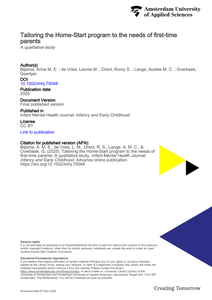Although first-time parents have a great need for effective support in the first challenging years of child upbringing, there is little research on volunteer-led parenting support programs in the context of the transition to parenthood. Therefore, this qualitative study examined the perceived value and key components of Home-Start, a volunteer-led parenting support program aimed at parents who have everyday parenting questions and receive little support from their environment, in the transition to parenthood. Semi-structured interviews were conducted among mothers (N = 10) with a first child up to 1.5 years old who were enrolled in the Home-Start program in the Netherlands, and volunteers (N = 12) who supported these parents. Important outcomes of the Home-Start program were increased positive parent-child interactions, improved parental confidence, and an expanded social network. Identified core needs of first-time mothers in the Home-Start program were social, emotional, informational, and instrumental support needs. Suggestions were provided to better align the program's structure with challenges in the transition to parenthood. For example, facilitating the parent-volunteer match during pregnancy, and developing a module in the Home-Start training for volunteers aimed at providing structured and informative support based on the latest insights into infant and postpartum care.
MULTIFILE

Worldwide, schools implement social-emotional learning programs to enhance students' social-emotional skills. Although parents play an essential role in teaching these skills, knowledge about their perspectives on social-emotional learning is limited. In providing insight into the perspectives of parents from adolescent students this paper adds to this knowledge. An explorative qualitative study was conducted to gain insight into parents' perspectives on adolescent social-emotional learning. A broadly used professional framework for social emotional learning was used as a frame of reference in interviews with parents from diverse backgrounds. Within and across case analyses were applied to analyze the interviews. A conceptual model of four social-emotional skills constructs considered crucial learning by parents emerged from the data: respectful behavior, cooperation, self-knowledge and self-reliance. Parents' language, interpretations and orderings of skills indicate that the model underlying these constructs differs from skills embedded in the professional framework.
MULTIFILE
